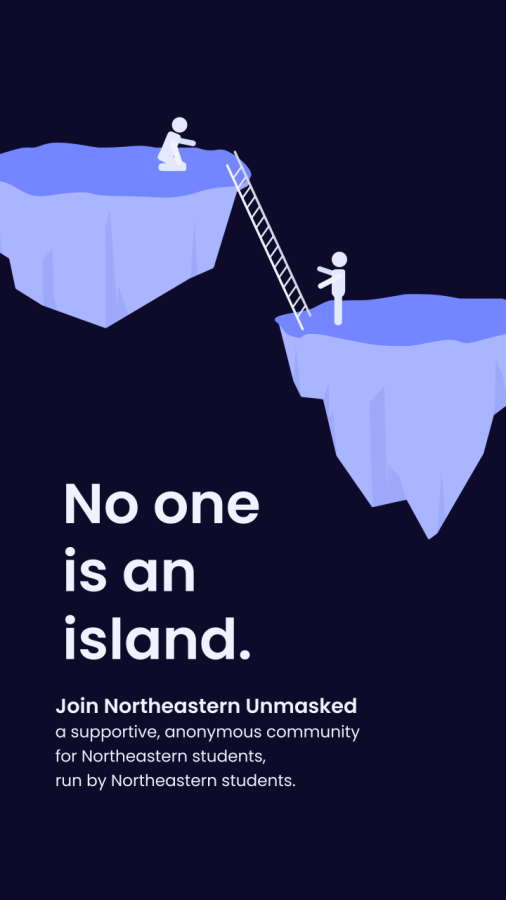NU Unmasked provides peer-based support
Northeastern Unmasked gives students an anonymous platform to post about their mental health. Photo courtesy Jun Tsuru.
December 10, 2021
Originally founded at Dartmouth University, the Unmasked app for student mental health officially arrived at Northeastern University in January 2020. The platform acts as a confidential resource for students to post, comment and converse about mental health topics: A place where, according to the founders, students can “take off their masks.”
The app now has over 10,000 users at 46 universities across the country, according to the Unmasked website.
When Petra Dragar, a fourth-year business administration major, first heard about the app, she knew that it was something she wanted to bring to Northeastern.
“A lot of people on our team, including myself, feel that mental health support such as counseling at Northeastern can be a little iffy,” Dragar said. “I have had friends who talked to counselors at Northeastern and were sent to a therapist that is not affiliated with the school, and so I felt that accessible mental health care was something that was missing.”
After gaining approval from the founders at Dartmouth, Dragar put together a team of 14 students to monitor posts on the app and spread the word on campus. Due to an increased use of virtual platforms for learning and socializing during the COVID-19 pandemic, the Unmasked team initially took their marketing efforts online.
Phillip Ricciardelli, a second-year business administration major, is the vice president of the campus relations team for NU Unmasked.
“We had this really cool product and had to figure out what we were going to do with it,” Ricciardelli said. “By the end of the year, we had around 150 downloads. This year we have an initial base and now it’s about how we get the app to be integrated into peoples’ lives. … We want there to be a niche of people that use it.”
Another moderator, Isabel Orchard, a fourth-year politics, philosophy and economics major and member of the campus relations team, said spreading the word about Unmasked has been a gratifying experience.
“One method of distribution for the app was speaking in classes about the app. Students would message me in the Zoom [chat] and tell me that it looked cool and that they were going to check it out, even though I’d never talked to them before, so that was really cool to see,” Orchard said.
The News asked the NU Unmasked team how they envisioned students using the app once it had been fully established at Northeastern. Dragar explained the app allows students to be vulnerable with one another, creating a safe environment to normalize conversations about mental health.
“In the most ideal situation, the goal of the app is to provide a platform for students to come and get it out there whatever they’ve been holding inside, it’s kind of life journaling or talking to a friend but anonymously,” Dragar said. “Some people might feel like they’re a burden to their friends or family and if they want to lean on someone in terms of good conversation, and I think that’s where the app comes in.”
Ricciardelli said he was inspired by the app because of its ability to have a real impact despite the simplicity of its design.
“Of course you can type about things that you’re feeling and get it out there, but I think a lot of it too is being able to look at a platform and seeing all the people who are sharing and thinking, ‘Wow, I’m not alone,’” Ricciardelli said. “We aren’t reinventing the wheel, it’s just a simple way to feel heard and feel acknowledged.”
Because the app deals with serious topics, it is designed to protect viewers from sensitive topics. Users can flag posts for certain trigger warnings, such as “drug abuse” or “depression,” and they will be hidden until viewers click on them. In addition, moderators monitor posts for indicators of a more serious situation that may require intervention.
“If we see a post that we think is a bit alarming we tend to private message the individual and have a more serious conversation with them about what state they’re in, and if it comes to it, there is a process through which that account can be uncovered and the person’s details will be shared with emergency professionals,” Orchard said. “In those kinds of situations we will talk as a team and think about what the next best step is.”
The founders said the response from the Northeastern community has been overwhelmingly positive. “[Unmasked] is something that people aren’t necessarily looking for but once they hear about it they think that it will be a great resource and something that they make use of,” Dragar said. “By looking through the app it sometimes even surprises me how deeply people are able to open up to each other. Hopefully, we can help as many people as possible.”
As Ricciardelli put it, the app is a way for students to reach out to their peers without much added effort, offering accessible support for those who are struggling.
“I just feel like it’s a really cool concept because it’s not extremely foreign to people, but it’s a little something to make a big difference,” he said.
Students looking to download the app can find it on the app store for both Apple and Android devices.


















